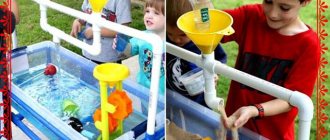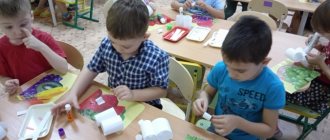The importance of design in the formation of a child’s personality
Construction, more than other types of activities, prepares the ground for the development of children's technical abilities, which is very important for the comprehensive development of the individual.
Biographies of many outstanding technical inventors show that these abilities sometimes manifest themselves even in preschool age. An example is the childhood of outstanding inventors: A. S. Yakovlev, I. P. Kulibin, V. A. Gasiev, T. A. Edison and others. What are some important personality qualities that are formed in the constructive and technical activities of adults, especially in activities of a creative nature, and lay the foundation for the formation of technical abilities?
The creative constructive and technical activity of adults is characterized by subtle observation, developed on the basis of great accuracy of perception and understanding of the technical essence of objects.
The designer must be able to imagine not only the structure of the machine, the design, but also the technical side of them: how, with what help are the parts held together? Which one is the main one for the entire structure? By what means is the mobility of parts and the structure as a whole achieved? How are all parts of the structure located not only in the frontal plane, but also in three-dimensional space?
Constructive and technical activities require relatively high concentration of attention. Before you start creating a structure, you need accurate calculations and thoughtfulness; when performing it, a certain consistency and accuracy in work is required. Any inaccuracy leads to serious miscalculations.
Creative constructive and technical activity of adults is characterized by developed spatial imagination, expressed in the ability to voluntarily operate with images of spatial imagination in accordance with the set goal. Before constructing a new machine, the creator must clearly visualize it and mentally follow the operation of the machine. Only after being convinced of a successful solution to the design problem as a whole does the designer agree to transform what he mentally created into a real product.
The designer’s imagination must be both extremely concrete and extremely abstract, i.e. he must have not only developed spatial imagination, but also a high degree of flexibility of thinking, which manifests itself not only in the ability to mentally create various specific variations of the general design of the machine, but also in the ability to promptly refuse such options that are impossible to implement under given conditions.
Technical abilities are characterized by emotional and volitional personality traits. They are expressed in interest in constructive activity, in the satisfaction that a person experiences when creating or improving any structure of social significance. Awareness of social significance in the creation of a new invention causes the inventor’s creative activity and desire to achieve his goal. Moreover, this responsibility manifests itself even when the designer or inventor has no interest in this type of technology.
The above qualities of a future designer begin to develop in children under the guidance of a teacher. Teaching children to design is of great importance in preparing children for school, developing their thinking, memory, imagination and ability for independent creativity.
During constructive activities, children form generalized ideas about the objects that surround them. They learn to generalize groups of homogeneous objects based on their characteristics and at the same time find differences in them depending on practical use. Each house, for example, has walls, windows, doors, but houses differ in their purpose, and therefore in their architectural design. Thus, along with common features, children will also see differences in them, that is, they acquire knowledge that reflects significant connections and dependencies between individual objects and phenomena.
In terms of preparing children for school, constructive activity is also valuable because it develops the ability to closely connect acquired knowledge with its use, the understanding that knowledge is simply necessary for success in activity. Children are convinced that the lack of necessary knowledge about the subject, constructive skills and abilities is the reason for failures in creating a structure, an uneconomical method of its manufacture, and poor quality of the result of the work.
During constructive activity classes, a preschooler develops important qualities; the ability to listen to the teacher, accept a mental task and find a way to solve it.
An important point in the formation of educational activity, as proven in research by employees of the Research Institute of Preschool Education of the Academy of Pedagogical Sciences of the USSR, is the reorientation of the child’s consciousness from the final result that must be obtained during a particular task to the methods of implementation. This phenomenon plays a decisive role in the child’s development of awareness of his actions and their results. The main focus of children's attention is the process itself and how to complete the task. They begin to understand that when completing a task, not only the practical result is important, but also the acquisition of new skills, knowledge, and new ways of acting.
Switching children's consciousness to ways to solve a constructive problem forms the ability to control their activities taking into account the task at hand, that is, self-control appears. This excludes mechanical performance of work in a once memorized way, simple imitation of a friend. The child is already able, as N.N. Poddyakov notes, “to analyze his actions, highlight their essential links, consciously change and rearrange them depending on the result obtained.” This makes it possible to teach children not only individual specific actions, but also general principles, patterns of action and prepares the child to understand his cognitive processes. The child learns to control his mental processes, which is an important prerequisite for successful schooling.








